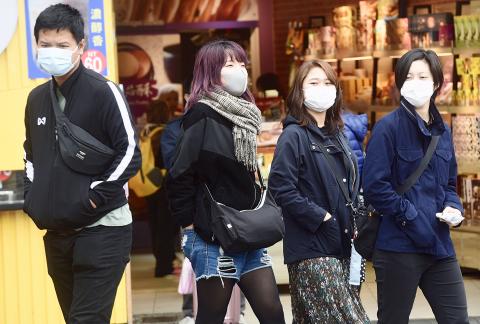A cold wave that arrived yesterday would affect the nation until Wednesday, with low temperatures in the northern and eastern regions dropping to 6°C, the Central Weather Bureau said.
The cold wave and frontal rain caused highs in Taipei to fall from 22°C in the early morning to 15°C, the bureau said.
By 4:30pm, the temperature in New Taipei City’s Cape Fugei (富貴角) had fallen to 7.9°C, it said.

Photo: Chien Jung-fong, Taipei Times
The combination of low temperatures and high humidity might cause snow to fall on Yushan (玉山) and Hehuanshan (合歡山) between tonight and tomorrow morning, the bureau said.
Bureau Deputy Director-General Cheng Ming-dean (鄭明典) wrote on Facebook that the phenomenon, where temperatures drop by more than 8°C be below 10°C within 24 hours, is called a “cold air outbreak.”
In the bureau’s observation station on Pengjia Islet (彭佳嶼), an island north of Taiwan, temperatures dropped by 6°C to 7°C within two to three hours, Cheng added.
The bureau said that temperatures are forecast to hit their lowest from tonight to early tomorrow morning.
Lows north of Tainan, as well as in Yilan and Hualien counties, could dip to 7°C to 11°C, it said, adding that temperatures in some coastal areas might drop to 6°C.
The lows in Kaohsiung, as well as Pingtung and Taitung counties, could slide to 12°C to 13°C, the bureau said.
Daytime temperatures in the north are not likely to exceed 12°C, while highs in the rest of the nation could reach about 20°C, it said.
From Wednesday to Friday, temperatures nationwide are to rebound, as the cold wave is to gradually weaken, with highs expected to exceed 20°C, the bureau said, adding that highs on Thursday and Friday could reach 23°C.
Except for showers along the east coast, cloudy to sunny skies are forecast for the rest of the nation, it said.
In related news, experts yesterday dismissed an online rumor that clouds have been carrying a new coronavirus that causes COVID-19 from China’s Chongquing and Hubei Province.
“The virus is mainly transmitted through human-to-human contact and through droplet infection. Aerosol transmission of the virus would only be possible in closed or semi-closed spaces,” said Wang Chia-cheng (王家蓁), director of Aerosol Science Research Center at National Chung Shan University, in an article published in the Chinese-language Liberty Times (the sister newspaper of the Taipei Times).
Environmental Protection Administration officials also dismissed the rumor.
Additional reporting by Liu Li-jen

CHIPMAKING INVESTMENT: J.W. Kuo told legislators that Department of Investment Review approval would be needed were Washington to seek a TSMC board seat Minister of Economic Affairs J.W. Kuo (郭智輝) yesterday said he received information about a possible US government investment in Taiwan Semiconductor Manufacturing Co (TSMC, 台積電) and an assessment of the possible effect on the firm requires further discussion. If the US were to invest in TSMC, the plan would need to be reviewed by the Department of Investment Review, Kuo told reporters ahead of a hearing of the legislature’s Economics Committee. Kuo’s remarks came after US Secretary of Commerce Howard Lutnick on Tuesday said that the US government is looking into the federal government taking equity stakes in computer chip manufacturers that

POWER PLANT POLL: The TPP said the number of ‘yes’ votes showed that the energy policy should be corrected, and the KMT said the result was a win for the people’s voice The government does not rule out advanced nuclear energy generation if it meets the government’s three prerequisites, President William Lai (賴清德) said last night after the number of votes in favor of restarting a nuclear power plant outnumbered the “no” votes in a referendum yesterday. The referendum failed to pass, despite getting more “yes” votes, as the Referendum Act (公民投票法) states that the vote would only pass if the votes in favor account for more than one-fourth of the total number of eligible voters and outnumber the opposing votes. Yesterday’s referendum question was: “Do you agree that the Ma-anshan Nuclear Power Plant

Chinese Nationalist Party (KMT) lawmakers have declared they survived recall votes to remove them from office today, although official results are still pending as the vote counting continues. Although final tallies from the Central Election Commission (CEC) are still pending, preliminary results indicate that the recall campaigns against all seven KMT lawmakers have fallen short. As of 6:10 pm, Taichung Legislators Yen Kuan-heng (顏寬恒) and Yang Chiung-ying (楊瓊瓔), Hsinchu County Legislator Lin Szu-ming (林思銘), Nantou County Legislator Ma Wen-chun (馬文君) and New Taipei City Legislator Lo Ming-tsai (羅明才) had all announced they

Nvidia Corp CEO Jensen Huang (黃仁勳) yesterday visited Taiwan Semiconductor Manufacturing Co (TSMC, 台積電), as the chipmaker prepares for volume production of Nvidia’s next-generation artificial intelligence (AI) chips. It was Huang’s third trip to Taiwan this year, indicating that Nvidia’s supply chain is deeply connected to Taiwan. Its partners also include packager Siliconware Precision Industries Co (矽品精密) and server makers Hon Hai Precision Industry Co (鴻海精密) and Quanta Computer Inc (廣達). “My main purpose is to visit TSMC,” Huang said yesterday. “As you know, we have next-generation architecture called Rubin. Rubin is very advanced. We have now taped out six brand new